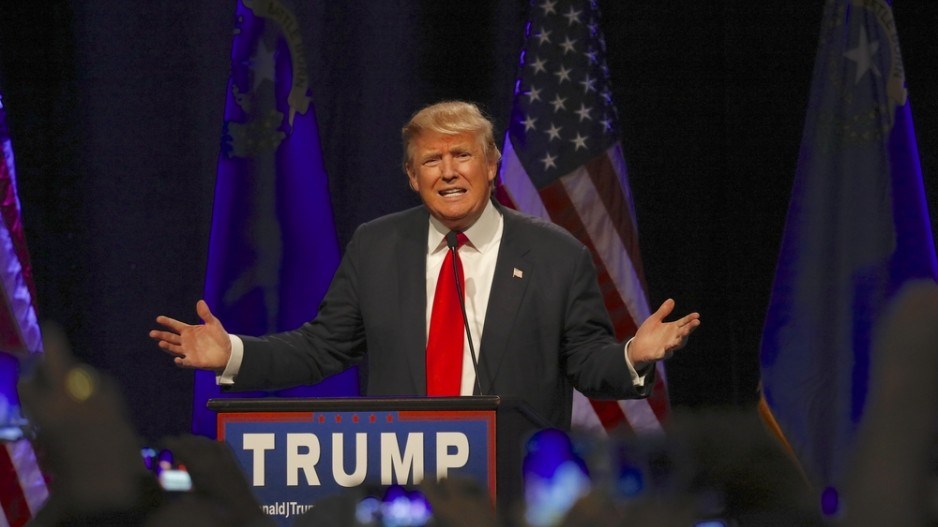On the same night that Americans elected a president who believes climate change is a hoax, and who has vowed to withdraw from the Paris Agreement and “unleash” a kraken of American coal and gas, Washington state voted down a revenue-neutral carbon tax in a referendum.
However, it wasn’t just right-wing climate change deniers who opposed the tax; the progressive left, including one of the most powerful environmental lobbies in the U.S. – the Sierra Club – campaigned against it.
The Sierra Club asked Washington state voters to reject the tax on the basis it didn’t go far enough and would have included some corporate tax cuts as part of its revenue neutrality.
Which begs the question: if Canadian proponents of carbon pricing don’t even have allies within the political left in Washington state, what are the ramifications for Canada’s own climate change policies and commitments with Donald Trump in the White House?
Jordan Bateman, B.C. director for the Canadian Taxpayers Federation, seized on Washington state’s rejection of a carbon tax as evidence the Pacific Coast Action Plan on Climate and Energy– signed in 2013 by B.C., Washington, Oregon and California – may be dead in the water.
And since the Washington proposal appeared to be modelled on B.C.’s carbon tax – insofar as it was to be revenue-neutral – Bateman sees it as a repudiation of the province’s much-vaunted carbon tax, in particular, and carbon taxes, in general.
“You have Washington state voters rejecting it, you have Trump who rejected it, you have the GOP Paul Ryan wing of the party saying absolutely no carbon taxes. Heck, you even had the Clinton campaign saying no carbon taxes,” said Bateman.
Kathryn Harrison, a political science professor at the University of British Columbia, thinks Trump’s climate change attitudes and actions could complicate things for Prime Minister Justin Trudeau.
When Ottawa announced a national carbon price of $50 per tonne by 2022, it was with the expectation it would have a partner in the U.S. that was also committed to climate change policies and the Paris Agreement. That is now is serious doubt.
Trump has appointed climate change skeptic Myron Ebell to handle the transition of the Environmental Protection Agency and has said he will withdraw the U.S. from the Paris Agreement, which commits signatories to set greenhouse gas reduction targets, and scrap the Clean Power Plan.
“The election of Donald Trump increases the political challenge of the Trudeau government following through on its commitment to establish carbon prices that would reach $50 per tonne by 2022,” Harrison said in a recent webinar on energy and climate policies hosted by the Pembina Institute.
Harrison said Trump’s reversal on climate change policies has “the potential to destabilize some very fragile political bargains that undermine the national climate change proposals in Canada.”
Washington state’s rejection by referendum of a revenue-neutral carbon tax that would have started at US$15 per tonne underscores just how politically difficult carbon taxes can be as a climate change tool – something Mark Jaccard has been trying to hammer home in recent weeks.
Jaccard, a professor at Simon Fraser University’s School of Resource and Environmental Management, says carbon taxes are the most effective tool for fighting climate change. However, it’s a tool that looks more like a weapon to some and can have fatal consequences for politicians who champion it.
Jaccard has suggested Canada consider other tools, like flexible regulations, which tend to get less notice by the public. These can include mandated low-energy building codes and low-emission standards for transportation.
One effective regulation is clean-energy standards. Some provinces and states are already well on their way in transitioning from fossil fuels to renewable power. But Trump has vowed to put the brakes on the move from coal to renewable power by scrapping the Clean Power Plan.
Greg Dotson, vice-president for energy policy at the Center for American Progress, pointed out that Trump has already backpedalled on a number of promises he made while campaigning. And given the falling cost of renewable power, he questions whether utilities will opt for coal power, even if given the option.
“I think, ultimately, the transition to a clean-energy economy is unstoppable, no matter what the administration does,” he said.
Ben Dachis, associate director of research for the C.D. Howe Institute, agrees the transition from coal to renewables and natural gas in the U.S. already has momentum that may be hard to stop. He doesn’t think utilities will make long-term capital investment decisions based on policies from an administration that may have only a four-year term.
“I’d be very surprised to see a lot of companies still invest in coal power knowing that they’re one presidential election away from going right back to the same old policies of reducing greenhouse gas emissions,” Dachis said.
His biggest concern is the impact scrapping the Clean Power Plan might have on Canadian utilities like BC Hydro, Manitoba Hydro and Hydro-Québec. The Clean Power Plan allows for Canadian power exports. He fears Canadian power producers may lose existing and future sales.
“I’m less worried about them building new coal power plants, but when it comes to phasing out coal power, I don’t think it’s going to happen quite as quickly,” he said. “And that’s probably going to mean fewer immediate opportunities for Canadian hydroelectricity.”
Dachis added that even though Trump wants to wind the clock backwards on climate change, that doesn’t mean states won’t continue to move forward.
As he points out, the Stephen Harper government was considered a climate change laggard, but that didn’t stop four of Canada’s biggest provinces from adopting their own climate change and carbon-pricing schemes.
Even without a national carbon-pricing scheme, 80% of Canada will have carbon pricing based on the policies of B.C., Alberta, Ontario and Quebec.




